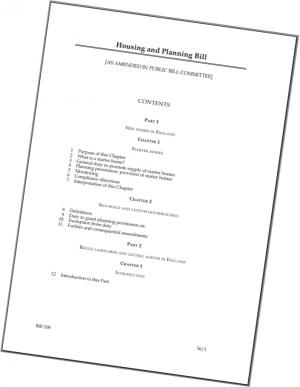



The Housing and Planning Bill, currently before Parliament, has some 31 clauses dealing with compulsory purchase orders. This article is a brief summary of the changes proposed by the Bill insofar as they are relevant to empty homes CPOs.
Powers of entry
You will often want to inspect an empty house or flat before you make a final decision on whether to make a CPO. At present there are powers of entry available under the Town and Country Planning Act 1990, the Housing Act 1985 and the Local Government (Miscellaneous Provisions) Act 1976. When a property is empty it is generally not necessary to obtain a warrant before entering the property. You can use reasonable force to gain entry and you just have to make the property secure when you leave.
The Bill changes things slightly. The powers of entry available in a variety of Acts are revoked, to be replaced by a standard set of provisions in what will be the Housing and Planning Act 2016. In addition, if you need to use force to enter you must obtain a warrant from a Magistrate. If you can gain access because, for example, the back door is not locked you will not need to obtain a warrant; but if you need to force the door you will now have to obtain a warrant.
Fourteen days’ notice of entry must be given and the notice must be accompanied by a copy of any warrant already obtained. (If you obtain the warrant after giving notice, you must give a copy of the warrant to the recipient of the notice as soon as possible). In addition the notice must tell the recipient of his right to claim compensation for any damage caused.
If you are intending to do an aerial survey, presumably with a drone, or if you are going to undertake intrusive surveys, this must be specified in the notice.
Specified time limits for handling CPOs
The Secretary of State will be obliged to publish a timeline for the confirmation process. This will be helpful in telling councils how long it will take from the making and submission of the order to the Department for Communities and Local Government, to its eventual confirmation. However there are no sanctions if the timetable is not met.
Inspectors to be able to make decisions on CPOs
Where there is an objection to a CPO by a qualifying person (ie someone with an interest in the property or an occupier) it will be considered either by written representations or at a public inquiry. An inspector appointed by the Planning Inspectorate will deal with the written representations or inquiry and at present will then write a report to the Secretary of State. The Secretary of State then takes the final decision. The Bill proposes that inspectors may in certain cases act on behalf of the Secretary of State. This will undoubtedly speed up the time for getting decisions through.
Time for making a General Vesting Declaration
The Bill clarifies that a GVD can be made at any time within 3 years of the notice of the confirmation of the CPO appearing in a local paper. Previously there had been some uncertainty over this. It also extends the period for the vesting of the land in the council following the making of the GVD. At present once a GVD has been made and notice of this has been served on the owner, title vests in the council 28 days later. Under the Bill this period is extended to 3 months.
However the reality is that there is no real change to the overall time from confirmation of the CPO to vesting the land in the Council. At present a special notice of intention to make a GVD has to be served and the GVD itself cannot be made until 2 months later. (This notice of intention is usually combined with the CPO confirmation notice). In future the ability of the local authority to make a GVD will be part and parcel of the confirmation notice and there is no need to wait 2 months before making the GVD. So all told, no real change. What was 2+1 month is now 3 months!
Advance payments
There are some detailed and technical changes to the rules on advance payments (whereby someone can ask for an advance payment of compensation, which is based on 90% of what the council thinks the eventual compensation will be). In view of the rarity of someone asking for an advance payment in an empty homes CPO case, it is just necessary to know that the rules have changed slightly and the council will have to make the payment sooner.
Chris Skinner works at Norfolk Public Law , specialising in Compulsory Purchase Orders and Enforced Sales.
